- Home
- Saul Tanpepper
THE FLENSE: China: (Part 3 of THE FLENSE serial) Page 11
THE FLENSE: China: (Part 3 of THE FLENSE serial) Read online
Page 11
He wondered, the boy, what it would feel like to hold that hand in his own, to touch the baggy covering and feel it slide over the brittle bones beneath his fingers. The time-withered muscle. The cables of sinew within their loose translucent sheath.
His eyes slipped to the side, to his own small hand tucked carelessly inside his father’s larger one. Both were puffy with flesh, the skin devoid of blemishes. Beneath the surfaces, bright red serum circulated, delivering its rich nourishment with exquisite precision and dependability. Unlike the old man’s, their palms were dry and cool despite the heat and humidity of the day.
The zookeeper paused just outside the doorway to the cage and jangled the ring on his belt, repeating the movement until the shy animal inside showed itself— not fully, but rather the wisp of a shape, a lighter shadow that suggested the presence of some hulking wild beast. There, the boy detected the hint of a nose, could sense the flaring of the dark nostrils as it became of aware his own scent. The gray cataract-filled eyes glistened as they peered almost intelligently through the bars, briefly catching the sunlight.
The key made a scraping sound as it entered the lock and turned. The ancient tumblers slipped and rattled and clanged before they found and settled into their niches. The latch snapped as it sprung free, the sound cracking the brittle moment. Another grunt came from the man’s throat as he leaned back and tugged the bulky door open. Tendons strained to the surface of his neck. Joints, both metallic and osseous, moaned in synchrony. The boy had witnessed the same wordless dialogue each and every day for the past three years; he knew it all by heart.
The animal stuck its snout further out of the darkness and sniffed silently at the searing afternoon air, but still it did not emerge. It never did at this point, not as far as the boy had ever observed. It would, he knew, eventually, but never just after the door had been pulled open. It would take more prompting to draw the creature out.
The acrid tang of the lab-grown meat stung the boy’s nose; the flesh beginning to spoil the moment the keeper removed it from its sterile bath. Outside, it attracted swarms of flies. The boy could see and hear them buzzing with senseless voracity, hovering about the bloodied rim of the pail. If he squinted just so, the swirling mass grew fuzzy. The man’s hand became an amorphous claw, a dull grayish-brown clump of animated clay, a tangled bundle of rotten-looking twine.
Some of the flies had strayed over to the railing, and he waved them away from his eyes. Even with all the technological advances brought forth in the past decades, none had succeeded in eradicating the useless pests. The strongest minds augmented by the best artificial intelligence could not conceive of a solution to the problem.
Some species follow no mathematical formula, his father commented. They obey no logical constraints.
Most did, the boy had been taught. Humans, for example, were very mathematical in their behavior. Although, as he had come to learn, there were exceptions. Some individuals simply defy being reduced to concrete principles.
The man reached into a back pocket of his coveralls and extracted a filthy handkerchief. He waved it ineffectually at the flies before dabbing at the rivers of moisture on his forehead. Even before he’d stuffed the flimsy fabric back into its place, new beads of sweat had erupted.
The flies resumed their chaotic spawning.
“Jumbe?” The man’s voice trembled and cracked as it passed through the frail larynx (which he was so rarely called upon to use anymore). He smacked his dry lips and waited. “Jumbe, come out and eat.”
After a moment, when the animal still hadn’t moved, he sighed and reached into the bucket and extracted the pale slab. It hit the cement just outside the metal door with an unquestionably organic sound.
The boy raised himself onto his tiptoes. He did not feel the ache on his upper lip as he pressed his face hard against the metal rail. Come on. Come on. He didn’t know why he even cared.
The father didn’t bother to answer.
Come out, Jumbe.
The boy could almost feel the keeper making his own silent supplications, hoping to coax the beast from its lair. But the shape behind the cage door still didn’t move.
At last the old man sighed. His shoulders fell an inch and his back stooped even more. He reached over and swiped at the metal plate beside the gate. There was a soft whir, almost too quiet to hear. At last, with a tired groan, the animal shuffled out.
This was why the boy had come to the menagerie, to witness the feeding. It’s why he came every day. Somehow, in a way he could not understand, he always expected the outcome to be different. He thought it was because the zookeeper felt the same way.
Why does he even bother? he asked. It was the same question he asked each time they visited. Why?
His father never seemed to tire of answering. Nor, for that matter, of bringing his son to this place when so few others bothered with it anymore. The zoo was an anachronism; menageries had been created to assuage guilt and curiosity. They so rarely provided any practical benefit, whether to the caged or to those who did the caging. Old habits are hard to break, he told his son, especially those so deeply ingrained as these.
The boy fell back onto his heels feeling something akin to disappointment. But he accepted the rote answer as the truth, even if he did not yet understand the reasoning behind it. It was their particular way, his and his father’s, and he trusted that one day such understanding would come. When he was ready. After his father had fully imparted his own knowledge into him. And all the proper connections had been made.
The ancient beast’s pelt, long since bleached white by the unrelenting sun, was badly tattered, though it still held a dusty hint of musk. There were bare spots where the fur had rubbed off. And when the animal turned, it exposed a tear in its side where the old sutures had come unraveled. Through the ragged gap the boy could see the underlying musculature, the atrophied meat and churning gears. The wound drew its own insect swarm, though the flies there seemed more languid. He wondered how many times the zookeeper had repaired the damage.
I don’t know, the father answered automatically. That information isn’t available.
For the first time, the boy was tempted to pose the question to the old man. He opened his mouth to fill his lungs with air, pursed his lips to form the words.
But the father gave the boy’s hand a warning squeeze. Hush. How will knowing help?
So, instead, for the thousandth time in as many days, the boy satisfied himself by reading the faded plaque attached to the post just outside the cage, even though he had long since committed each word to memory:
AFRICAN LION
Panthera leo, subspecies persica
[extinct]
ONCE THE APEX PREDATOR ON THE AFRICAN SUBCONTINENT, THIS MALE, THE LAST KNOWN INDIVIDUAL OF ITS KIND, DIED OF WASTING DISEASE IN THE YEAR 2027. IT WAS REANIMATED AT THE INSTITUTE FOR THE PRESERVATION OF WHOLLY BIOLOGICAL ARTIFACTS AND SUBSEQUENTLY ADDED TO THE ZOO’S COLLECTION IN THE FOLLOWING YEAR. IT IS THE ONLY REMAINING FULLY FUNCTIONING CYBERNETIZED AFRICAN LION ON PUBLIC DISPLAY.
‡ ‡ ‡
Want to know how this ends?
Then check out the book here.
Tanpepper Tidings Newsletter
If you like short fiction, then check out S.W. Tanpepper's story collection:
http://www.tanpepperwrites.com/collections
Includes:
Occupied
Mr. November
The Headhunter
The Object of Her Obsession
Nocturne
Outsourced
Open wide
Golgotha
AVAILABLE IN DIGITAL AND PRINT
ACKNOWLEDGMENTS
My thanks to the devoted staff of Brinestone Press, who helped put this book together and get it out to you.
ABOUT THE AUTHOR
Saul Tanpepper is a writer of speculative fiction for teens and adults. A former molecular geneticist originally from Upstate New York, he now calls Northern California home.
>
If you enjoyed Part 3 of THE FLENSE: CHINA twelve-part serial, then you'll want to check out the companion series, BUNKER 12, which follows the apocalyptic events detailed in THE FLENSE. You may also enjoy the GAMELAND series, an epic cyberpunk adventure through a post-apocalyptic world in which zombies are used as avatars in a twisted live action game for the amusement of the rich and privileged. Sign up for the Tanpepper Tidings for a free starter library. You can find out more about all of Saul's titles at his:
Website
Facebook page
Twitter page
‡ ‡ ‡ ‡ ‡
The Flense: China (Part 03)
by Saul Tanpepper
Copyright © 2015 by Saul Tanpepper
All rights reserved.
September 15, 2015 by Brinestone Press, San Martin, CA 95046
Cover credit K.J. Howe Copyright © 2015
Photo licensed from Depositphoto.com
PUBLISHER’S NOTE
This book is a work of fiction. Names, characters, places, and incidents either are the product of the author’s imagination or are used fictitiously, and any resemblance to actual persons, living or dead, business establishments, events, or locales is entirely coincidental.
LICENSE NOTES
Without limiting the rights under copyright reserved above, no part of this publication may be reproduced, stored in or introduced into a retrieval system, or transmitted, in any form, or by any means (electronic, mechanical, photocopying, recording, or otherwise), without the prior written permission of both the copyright owner and the above publisher of this book. The scanning, uploading, and distribution of this book via the Internet or via any other means without the permission of the publisher is illegal and punishable by law. Please purchase only authorized electronic editions, and do not participate in or encourage electronic piracy of copyrighted materials. Your support of the author’s rights is appreciated.
http://www.brinestonepress.com
Tanpepper, Saul (2015-09-15). The Flense: China (Part 2)
Brinestone Press Digital Edition (rv150915)
For more information about this and other titles by this author:
[email protected]
‡ ‡ ‡

 Open Wide
Open Wide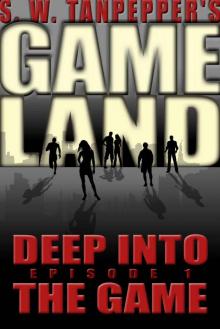 Deep Into the Game: S.W. Tanpepper's GAMELAND (Episode 1) (Volume 1) (S. W. Tanpepper's GAMELAND)
Deep Into the Game: S.W. Tanpepper's GAMELAND (Episode 1) (Volume 1) (S. W. Tanpepper's GAMELAND)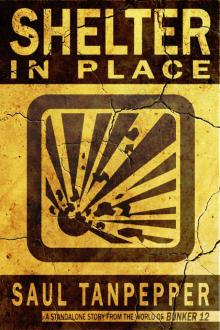 Shelter in Place: A short story from the world of BUNKER 12
Shelter in Place: A short story from the world of BUNKER 12 Iceland: An International Thriller (The Flense Book 2)
Iceland: An International Thriller (The Flense Book 2) GAMELAND Episodes 1-2: Deep Into the Game + Failsafe (S. W. Tanpepper's GAMELAND)
GAMELAND Episodes 1-2: Deep Into the Game + Failsafe (S. W. Tanpepper's GAMELAND) THE FLENSE: China: (Part 1 of THE FLENSE serial)
THE FLENSE: China: (Part 1 of THE FLENSE serial) S.W. Tanpepper's GAMELAND, Season One Omnibus
S.W. Tanpepper's GAMELAND, Season One Omnibus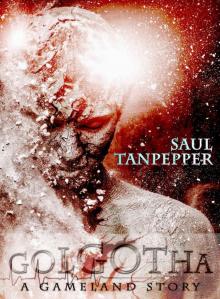 Golgotha: Prequel to S.W. Tanpepper's GAMELAND series (S. W. Tanpepper's GAMELAND companion title Book 1)
Golgotha: Prequel to S.W. Tanpepper's GAMELAND series (S. W. Tanpepper's GAMELAND companion title Book 1) THE FLENSE: China: (Part 3 of THE FLENSE serial)
THE FLENSE: China: (Part 3 of THE FLENSE serial)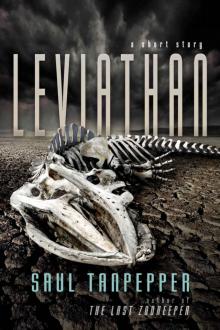 Leviathan: A Short Story About the End of the World
Leviathan: A Short Story About the End of the World Insomnia: Paranormal Tales, Science Fiction, & Horror
Insomnia: Paranormal Tales, Science Fiction, & Horror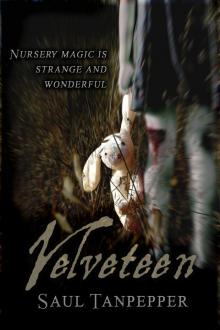 Velveteen
Velveteen THE FLENSE: China: (Part 2 of THE FLENSE serial)
THE FLENSE: China: (Part 2 of THE FLENSE serial) Deadman's Switch & Sunder the Hollow Ones
Deadman's Switch & Sunder the Hollow Ones